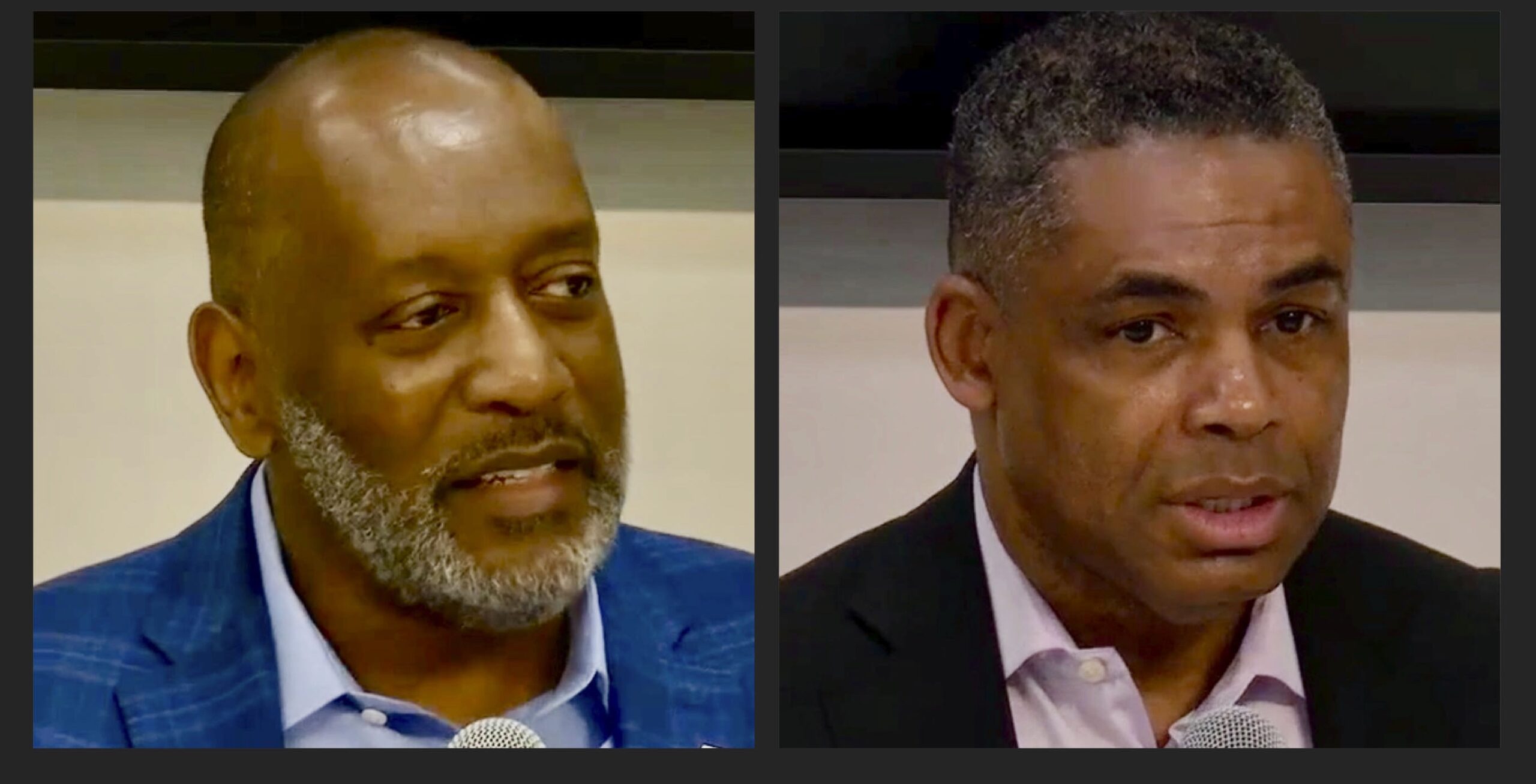
April 30, 2024
Two Charlotte business executives were invited to update the community and the Forum about the work of the ongoing Charlotte Executive Leadership Council. The group, represented a wide swath of Charlotte’s corporate citizens, is pouring staff time, talent and treasure into Charlotte-Mecklenburg Schools. Both executives emphasized that many companies are involved, not just their own.
The motive of course is not entirely altruistic: These businesses would like to hire skilled workers locally. How CMS fares in its effort to raise educational outcomes for all will aid or frustrate those efforts.

Presenters were Malcomb Coley, managing partner of EY Charlotte; and Kieth Cockrell, president of Bank of America Charlotte.
The Forum began with a moment of silence honoring four law enforcement officers killed in the line of duty Monday.
The executives talked about how leaders like themselves, and all adults in the community, need to find ways to be in the schools. The children, they said, need mentors. But they need more: Children learn that their time in school is valuable when they see adults valuing it enough to be present.
– Asked whether CMS was really committed long-term to the national standard of ensuring all graduates are college- or career-ready, Cockrell said he personally did not support the military service element in the schools’ current “enroll-employ-enlist” mantra. Speaking to a largely African-American audience, Cockrell said, “We are over-represented in the military, so I personally don’t like the focus on or position on enlisting. Our focus is on enrollment and employment.”
– Asked whether CMS should be moving its best teachers to teach the most challenged students, Cockrell responded with details about the first years of Renaissance West STEAM Academy. Early principals were credentialed, and hired credentialed staff, but Cockrell said there was a disconnect between the adults and the high-needs students in the school built on the old Boulevard Homes housing project site. “It didn’t work for (the adults). It didn’t work for the kids. (The adults) left.” He praised Dwight Thompson, recently named a Wells Fargo Regional Principal of the Year.
– Asked why the business community had increased its 12- or 18-month commitment to Leadership Council initiatives, Cockrell said the business group valued continuity during the building of cultures of leadership and wanted to stay the course. He also mentioned that the group had an arrangement that, if CMS Supt. Crystal Hill achieves all of the Board of Education’s goals, that the group would supplement Hill’s pay, to discourage her from leaving just to increase her pay. He offered no details.
– Asked how young people could be coached in how to increase their disposable income, Coley refocused on how young people should pay more attention to keeping the dollars they have among their own neighbors. In Black neighborhoods, he said, a dollar leaves the neighborhood in 6 hours, mostly by being spent at businesses owned outside the neighborhood. In other neighborhoods, a dollar stays in the neighborhood 21 or 28 days.
– The presenters were asked whether the executive group would support a statewide effort to financially support legislative candidates of any party who would pledge to vote to fully fund the Leandro decision. Leandro is a decades-old NC court case that has prodded legislators to fund education enough to give every child a “sound basic education.” No commitments were made, but the question really got the presenters’ attention.
The impossible task of summarizing Leandro fell to County Commissioner and former CMS Board of Education chair Arthur Griffin. His handout explaining to the presenters the case is in a PDF here. Entire bookshelves are devoted to this case. One online repository is at the Public School Forum. A more narrative approach with voluminous links elsewhere is at the Public Schools First website.
Coley said, “This is something we will take back. We know our education system is under attack.”
– Asked about support for Johnson C. Smith University, Colely called the HBCU “a gem that is in our backyard.” Cockrell is currently board vice chair and said he had already been asked whether he would agree to serve as chair. This Columbia University graduate reportedly replied that “it would be tremendously valuable to have an alum as chair.”
– During discussion of the summer internship programs, both presenters talked about how they were not just hiring young people for the equivalent of the old mailroom jobs, but devoting staff time to develop these young people as leaders.
– A question about students absent from school prompted Cockrell to discuss what he had learned through his connection to My Brother’s Keeper, a national effort launched by the Obama Foundation in 2014. Cockrell said BofA staff have been involved in knocking on doors at the homes of chronically absent students. The stories, Cockrell said, include visits with 12th graders who are caring for younger siblings all day while their parent works.
– In a similar vein, Cockrell said he was struck by how CMS had made progress recruiting teachers, but that some of them backed out when they could not find affordable housing. “We have to play a role, in financial services, to provide for what I’ll call ‘hometown heroes.”
– A question about barriers to providing students with support for their emotional health brought another of what Supt. James Pughsley called “big rocks.” Cockrell said Atrium Health could provide physical health and emotional health services at high schools and middle schools, but was barred by N.C. law from providing any emotional health interventions at elementaries.
In a final word about what the bank’s contacts with CMS on a daily basis had taught him, Cockrell said that as he worked with school staff, he had no push-back for advocating for better educational outcomes for all students. “Educators are committed to better outcomes,” he said. “They want it as much as I do.”
In the May 9 Business North Carolina Daily Diges., longtime Charlotte journalist and Business North Carolina editor David Mildenberg reprised the Forum session, adding that “it was encouraging to hear these two powerful executives call for straight-forward, outcome-oriented efforts to improve the education of needy students.” A PDF version of the Digest is here.